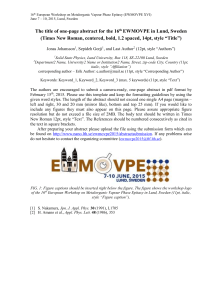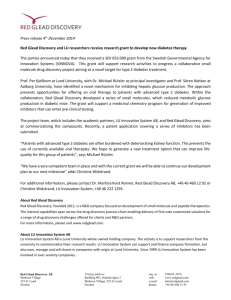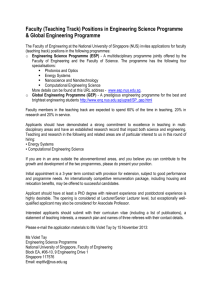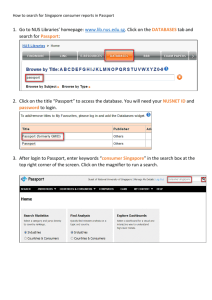Lund University, Sweden S1 04/05 - Goh Si Xian
advertisement
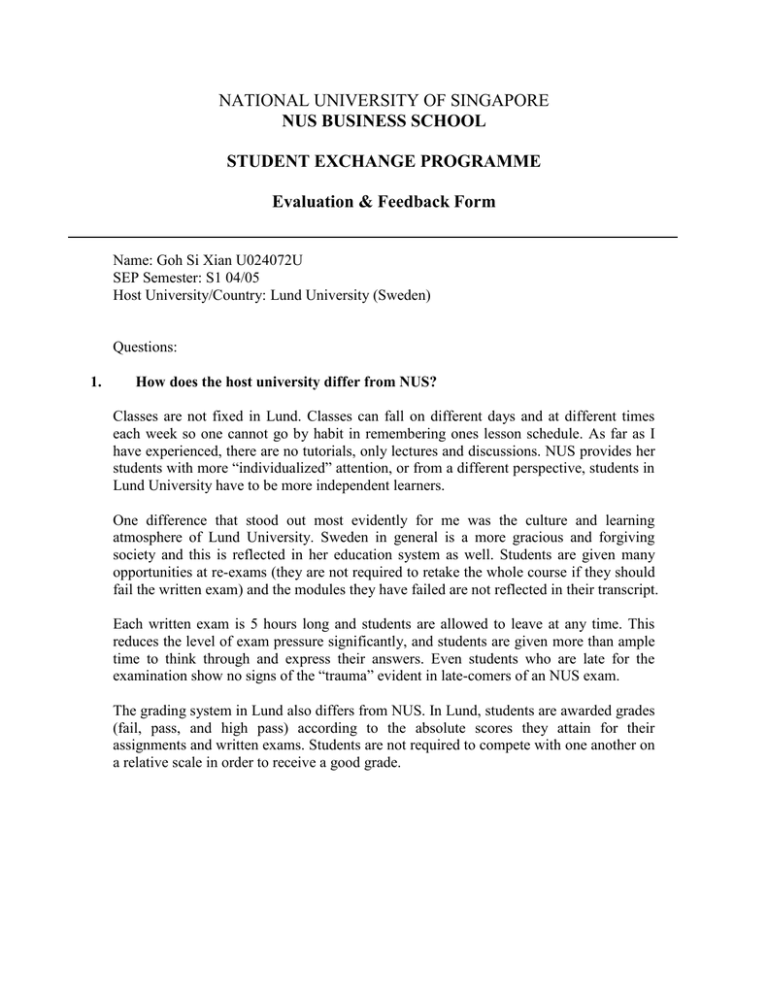
NATIONAL UNIVERSITY OF SINGAPORE NUS BUSINESS SCHOOL STUDENT EXCHANGE PROGRAMME Evaluation & Feedback Form Name: Goh Si Xian U024072U SEP Semester: S1 04/05 Host University/Country: Lund University (Sweden) Questions: 1. How does the host university differ from NUS? Classes are not fixed in Lund. Classes can fall on different days and at different times each week so one cannot go by habit in remembering ones lesson schedule. As far as I have experienced, there are no tutorials, only lectures and discussions. NUS provides her students with more “individualized” attention, or from a different perspective, students in Lund University have to be more independent learners. One difference that stood out most evidently for me was the culture and learning atmosphere of Lund University. Sweden in general is a more gracious and forgiving society and this is reflected in her education system as well. Students are given many opportunities at re-exams (they are not required to retake the whole course if they should fail the written exam) and the modules they have failed are not reflected in their transcript. Each written exam is 5 hours long and students are allowed to leave at any time. This reduces the level of exam pressure significantly, and students are given more than ample time to think through and express their answers. Even students who are late for the examination show no signs of the “trauma” evident in late-comers of an NUS exam. The grading system in Lund also differs from NUS. In Lund, students are awarded grades (fail, pass, and high pass) according to the absolute scores they attain for their assignments and written exams. Students are not required to compete with one another on a relative scale in order to receive a good grade. 2. What strong points does our School have compared to the partner university? The NUS Business School is certainly blessed with better facilities. Lessons are generally also more structured in NUS Business School and I think most Singaporean students will find this exceptionally helpful during their first year when they are building their foundation of business concepts. We have also been blessed with excellent and dedicated teachers as well as non-teaching staff. 3. What strong points does the partner university have compared to our School? The Swedish students in Lund are not so fearful of making mistakes and take failure more positively. The learning atmosphere is thus generally more positive. There is also a lower degree of reliance on American textbooks and in general, students read a few thinner books instead of one thick textbook for each course. The partner university also structures the lectures in such a way that a few lecturers teach each course instead of just one. This exposes students to a wider variety of expertise and experiences. 4. What expenses did you incur at the host university for one semester? Estimated Breakdown of Expenses: Items Airfare (Return Ticket) Travel & Health Insurance Accommodation Food Books and Stationary Clothing Miscellaneous (Eg: local transportation, phone calls, postage, student visa, medical report) Others (Eg: Extended stay, airfare for tour of neighboring states/countries, etc) Please specify here: Total Estimated Expenditure (S$) 2000 300 3000 1000 250 200 500 1000 8250 5. Please type a THREE to FIVE page report of your personal experience in the host university. a) Your overall experience overseas (initial culture shock that you encountered, lifestyle, about the university, academic aspects) b) What you have learnt from the exchange program c) Your advice and suggestions for future exchange students designated to go to that university The four and a half months that I spent on exchange between the 16th of August and the 28th of December 2004 have been the most enriching and memorable experience in my life. Like most of my peers, I felt the initial feelings of excitement, anxiety, confusion, and enthrallment during my early days in Lund. There was a child-likeness and a sense of wonderment to it all. The culture is Sweden is most certainly different from that in Singapore but nothing so dissimilar or usual which resulted in “culture shock”. The feelings of anxiety resulting from the unfamiliarity of the new environment faded quickly. It took time to find out where certain facilities/places were, and how to settle certain administrative processes such as paying of bills and stuff but it was all part of the fun of moving into a new place. I enjoyed getting lost and finding my way around. Daily life in Lund was serene, filled with the simplest of pleasures. Going running, baking, reading outdoors with the company of the prettiest of flowers, movie nights with friends/corridor-mates, doing project work with people of other nationalities, taking walks with a friend; nothing too extravagant yet these are the moments during my exchange that I cherish most. The exchange program has taught me the importance of relationships. I started this journey quite alone as I did not know anyone very well and I feel very blessed to have left with many special friendships. The time we had together was not very long yet the moments we shared were neither hurried nor centered on academic matters. I realized that if not for these relationships that were formed over the course of my exchange, the entire experience would have been far less valuable to me. The exchange program also taught me a lot about myself through my own quiet reflections and also through the words of others. Two close friends that I made over the course of my exchange told me that their first impression of me was that I worked too hard. These friends have taught me not to take myself so seriously and have generously shared precious life lessons with me. I will always remember the last walk I took with one of them one winter night. I walked my friend home and just as we were about to reach his apartment he asked me if this exchange experience has changed me. I gave him a reply but until today I am still discovering the differences in my perspectives, values and attitudes. I believe one reason for this change was from the many moments of quiet reflections I had in Sweden be it by a pond or whilst leaning against a tree in an open field. It is an underappreciated necessity that is seriously lacking in Singapore– quietude. Someone I admire greatly once wrote: “The human heart was meant for times of quiet, to peer deep within. It is when we do this that our hearts are set free to soar and take flight on the wings of our own dreams.” The time on exchange allowed me to learn a lot about myself. Another lesson that I learnt was to be more tolerant of differences in opinions and hence to listen more closely to other people. During my stay in Sweden, I discovered that capital punishment is not viewed favorably by the general populace. In Singapore we have for a long time accepted it as part of our legal system and perhaps even consider it to be an effective deterrent against potential criminals. This difference in opinions has made me more awareness of society’s influence on ones thinking and to be more careful in distinguishing “truth” from mere opinion. One difference that I noticed about myself only when I went back to school in NUS was that I speak up more in class now. I am bolder in voicing my opinions and I enjoy participating in class discussions much more. I find it difficult to explain because in Sweden I hardly ever spoke up in class and there were no grades awarded to class participation. Yet, it was the whole exchange experience in its entirety that has helped me to make these positive changes. For future exchange designated to go to Lund University, they might want to bring as many textbooks as they can from Singapore as cost of textbooks in Sweden is exceptionally high. One can buy a new textbook in Singapore and sell in second hand in Sweden at a higher price. The banks in Lund generally do not accept travellers’ cheques so future students ought to consider how they would want to bring their money over (for instance getting a relative to transfer money over from Singapore when the bank account in Sweden is set up, or withdrawing money with a credit card and cashing it into the bank account). Since it takes two weeks for the bank to issue an ATM card, it would also be advisable to bring sufficient cash for at least a month. About S$1000 (4000 kr) should be more than sufficient. From personal experience, one should also refrain from bringing too many things on exchange because you would very likely need less than you think. There are some courses that are more popular with international students such as the courses under the general heading of “Scandinavian Studies”. The workload for these courses is quite light, perhaps equivalent only to about 4 to 5 weeks of work in NUS. However, for those who want to take finance courses in Lund, the ones offered at the Masters level are pretty worthwhile ( if you enjoy something more challenging), but do be prepared to work hard. Definitely no last minute work for these courses if you hope for at least a pass. For those who are planning on traveling, do be careful. Lund is pretty safe but be watchful of your valuables when you travel. As far as possible, try to keep them on you and not in a bag. Take time to smell the roses and mix around with people of different nationalities, and even those from your own home University. You will realize that first impressions, though pretty lasting, can be quite inaccurate. In most cases, you will be pleasantly surprised. All in all, your time on exchange will be among the most fun, meaningful, memorable, and life-changing months in your life.

